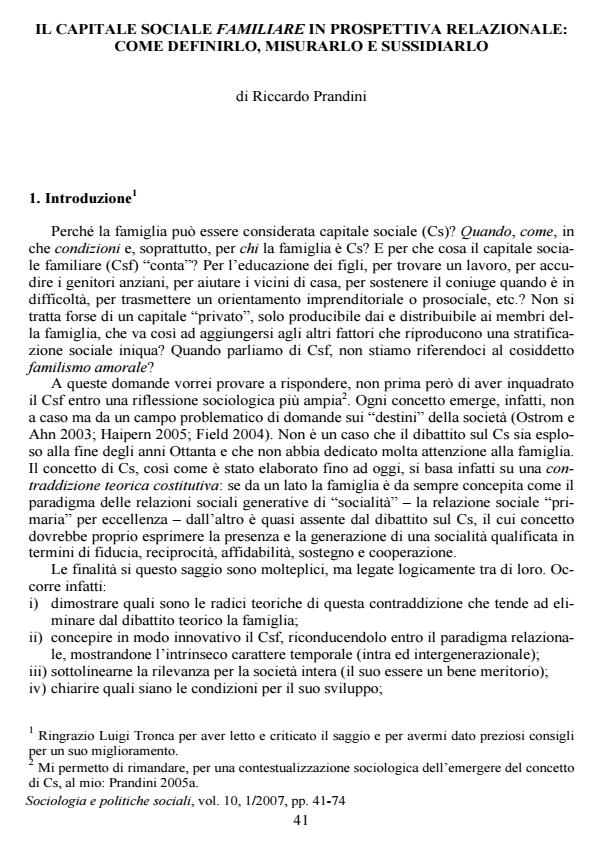Il capitale sociale familiare in prospettiva relazionale: come definirlo, misurarlo e sussidiarlo
Titolo Rivista SOCIOLOGIA E POLITICHE SOCIALI
Autori/Curatori Riccardo Prandini
Anno di pubblicazione 2007 Fascicolo 2007/1 Lingua Italiano
Numero pagine 34 P. 41-74 Dimensione file 295 KB
DOI
Il DOI è il codice a barre della proprietà intellettuale: per saperne di più
clicca qui
Qui sotto puoi vedere in anteprima la prima pagina di questo articolo.
Se questo articolo ti interessa, lo puoi acquistare (e scaricare in formato pdf) seguendo le facili indicazioni per acquistare il download credit. Acquista Download Credits per scaricare questo Articolo in formato PDF

FrancoAngeli è membro della Publishers International Linking Association, Inc (PILA)associazione indipendente e non profit per facilitare (attraverso i servizi tecnologici implementati da CrossRef.org) l’accesso degli studiosi ai contenuti digitali nelle pubblicazioni professionali e scientifiche
Family’s Social Capital: definition, measurement and subsidies (by Riccardo Prandini) - The first purpose of this essay is to explain why in the debate about Social capital, which spread across the social scientific community in the last two decades, the family as a social relationship had no real import. In the first part of the essay, Prandini finds the answer in what he calls the modernist theoretical bias, a set of sociological prejudices (operative in different theories: rational choice, functionalism, system theory, structuration theory, etc.) which considers the family relationship as a sort of organic relict of pre-modern societies, a constraint for social development and an obstacle for the full deployment of less bonding social relations. Prandini criticizes this way of thinking and, in the second part of the essay, tries to suggest a new way for defining, measuring and subsidizing the family social capital. The family’s social capital, now embedded in the relational approach, is defined as a property and a quality of social relationships and not as an attribute of individuals or social structures; it is not a mixture of the two either. It represents that reciprocal orientations of the family’s members which, through processes of social condensation, are able to generate trustworthiness and so to engender cooperative actions ad experiences. This special kind of Social capital must be differentiated in: 1) nuclear social capital, and 2) kinship social capital (the latter including relationships with non-co-resident relatives). Furthermore, the former (nuclear social capital) can be analytically examined, differentiating it in conjugal social capital, parental social capital and brotherly social capital. Only by distinguishing these different kinds of social capital is it possible to study their actual relationships. Studying the interplay between nuclear and kinship social capital also means that the sociologists has to include time in his concepts and analysis. Only in this way is it possible to observe the generations and degenerations, the morphogenesis and morphostasis of family social capital. The third part of the essay is dedicated to the operazionalizations and measurements of social capitals. The Author suggests that each operazionalization depends upon the research design, and that it is not useful to introduce only one way to do it. Moreover, there are good reasons for utilizing a certain kind of definitions and measurement in order to develop quantitative research, and various other good reasons when the sociologist carries out a qualitative research. Nowadays network analysis provides new methodologies and measurement systems that are particularly useful to develop in deep research about social capital. The Author concludes his essay calling for new ways of subsidizing the family social capital. He suggests that the modern social welfare system is currently not skilled enough to sustain the processes that generate social capital, and that it is time to shift to a new kind of welfare, one we may call societal and pluralistic.;
Riccardo Prandini, Il capitale sociale familiare in prospettiva relazionale: come definirlo, misurarlo e sussidiarlo in "SOCIOLOGIA E POLITICHE SOCIALI" 1/2007, pp 41-74, DOI: